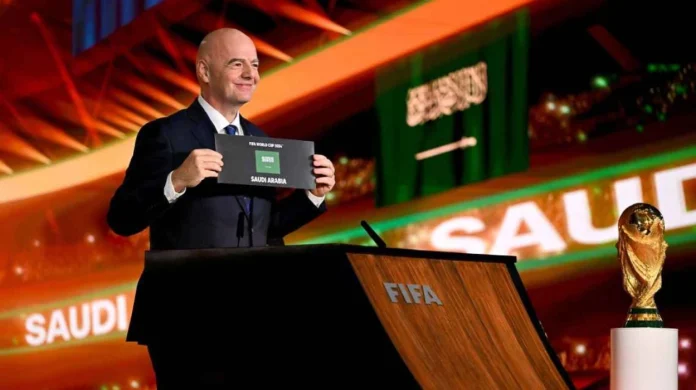In May 2025, the controversy surrounding Saudi Arabia’s selection as host for the 2034 FIFA World Cup reached a boiling point. A formal complaint filed by a coalition of international lawyers, mounting reports of migrant worker deaths, and widespread criticism from human rights organizations have placed FIFA under unprecedented scrutiny. As the world’s most popular sporting event gears up for its most ambitious-and contentious-edition yet, the debate over ethics, transparency, and the true cost of football’s global expansion is more intense than ever.
Formal Complaint: FIFA Accused of Breaching Its Own Human Rights Rules
On May 15, 2025, a group of leading international lawyers-including FIFA’s former anti-corruption adviser Mark Pieth, Swiss lawyer Stefan Wehrenberg, and British barrister Rodney Dixon-filed a 30-page formal complaint to FIFA through its official grievance portal. The complaint alleges that FIFA is failing to uphold its own human rights policies by awarding the 2034 World Cup to Saudi Arabia, a nation criticized for ongoing violations of freedom of expression, arbitrary arrests, judicial independence, migrants’ rights, and women’s rights.
The lawyers emphasized that, despite FIFA’s 2017 human rights policy requiring host nations to respect international standards, “no steps are being taken by FIFA to address these in the buildup to the World Cup.” The document calls for urgent action in five key areas:
- Freedom of expression and association
- Arbitrary arrests, mistreatment, and the death penalty
- Judicial independence
- Migrants’ rights
- Women’s rights
“Widespread human rights abuses continue to be perpetrated in Saudi Arabia, and no steps are being taken by FIFA to address these in the buildup to the World Cup. Instead, it appears it is business as usual with no changes to be made.”,
said Formal complaint by international lawyers
The complaint further criticizes the bidding process, which saw Saudi Arabia confirmed as host by acclamation in December 2024 after all potential rivals withdrew. The lawyers argue that the process “failed to ensure that human rights standards were met” and that FIFA must develop a “concrete and transparent action plan in collaboration with the Saudi authorities, rather than relying on the host state to act unilaterally”
Migrant Worker Deaths: “Utter Negligence” and Repeated Tragedy
The most damning recent revelations concern the treatment of migrant workers. Two leading human rights organizations released reports in May 2025 accusing FIFA of “utter negligence” regarding the deaths of at least 48 migrant workers from Bangladesh, India, and Nepal during World Cup-related construction in Saudi Arabia. The findings detail a host nation that pays only lip service to safety regulations, conducts inadequate accident investigations, and is notoriously slow to compensate bereaved families.
“The horrific workplace incidents resulting in the deaths of migrant workers in Saudi Arabia should serve as a significant warning for businesses, football enthusiasts, and sports organizations looking to collaborate with FIFA on the 2034 Men’s World Cup and other massive Saudi projects.”,
stated Michael Page, Deputy Director, Human Rights Watch, Middle East
These revelations echo the controversy that engulfed Qatar’s 2022 World Cup, where hundreds of unexplained migrant worker deaths sparked global outrage. Despite promises of reform-including the abolition of some aspects of the kafala system and the introduction of standardized contracts-critics argue that Saudi Arabia’s changes are insufficient and poorly enforced.
“Sportswashing” and the Vision 2030 Agenda
Saudi Arabia’s World Cup bid is part of a broader, multi-billion-dollar campaign to transform the kingdom’s global image and diversify its economy under Crown Prince Mohammed bin Salman’s Vision 2030 program. The Public Investment Fund (PIF) has poured vast sums into international sports, acquiring Newcastle United, investing in the Saudi Pro League, and luring global stars like Cristiano Ronaldo and Neymar to play in the kingdom.
This strategy, often labeled “sportswashing,” is designed to project a modern, progressive image while critics argue it distracts from ongoing repression and human rights abuses. The complaint filed in May 2025 explicitly references this tactic, warning that hosting the World Cup provides “no incentive” for genuine reform and risks entrenching the status quo.
Fan Safety, LGBTQ+ Rights, and Social Restrictions
Beyond labor rights, the 2034 World Cup faces intense scrutiny over issues of personal freedom and fan safety. Same-sex relations remain illegal in Saudi Arabia, and transgender identities are not recognized. Alcohol is banned, and there are no indications this will change for the tournament.Human rights campaigners and football associations have raised concerns about the safety of LGBTQ+ fans, women, and other vulnerable groups.
A coalition of over 20 organizations-including Saudi diaspora groups, international trade unions, and fan associations-released a joint statement in March 2025 warning that the tournament “risks lives and exposes FIFA’s empty human rights commitments”.
FIFA’s Response: Promises and Contradictions
In response to mounting criticism, FIFA has repeatedly stated its “steadfast commitment to the protection and promotion of human rights in the context of its operations”. In a letter to Human Rights Watch, FIFA’s general secretary Mattias Grafstrom highlighted recent reforms in Saudi Arabia and the organization’s efforts to incorporate human rights into its statutes. However, critics argue that these statements are contradicted by FIFA’s actions, pointing to a lack of meaningful enforcement or oversight.
FIFA President Gianni Infantino has further tied the organization’s finances and politics to Saudi Arabia, drawing comparisons to the relationship with Qatar ahead of the 2022 World Cup. The lack of transparency in the bidding process and the absence of rival bids have only fueled suspicions that commercial and political interests outweigh ethical concerns













